Is Hong Kong’s New Talent Scheme Solving Its Labour Problems?
By Susan Su Xuan & Iris Rong
In early February, Vivian Ma, a 33-year-old mother of two, learned about Hong Kong’s newest talent attraction scheme from her college alumni online chat group.
A graduate from Sun Yat-sen University –a first-tier mainland university – with nearly seven years of working experience, Ma found herself easily fitting the bill. She didn’t know much about Hong Kong and had no immediate plan to relocate either.
“I just think it is a good opportunity, and gave it a try out of convenience,” Ma said.
The Top Talent Pass Scheme (TTPS), launched by the Hong Kong government last October, targets well-skilled high-earners and degree-holders from the world’s top 100 universities. Successful applicants would be granted an unconditional two-year visa in Hong Kong without even having to secure a job offer first.
Ma, an administrative staff member at a renewable energy company, lives with her husband and two kids of eight and two respectively, in Wuhan, Central China. The couple is expecting another child this summer. Initially, she planned to give birth to her third child in Hong Kong after obtaining the visa. However, after some consideration, she changed her mind and decided to stay in the mainland.
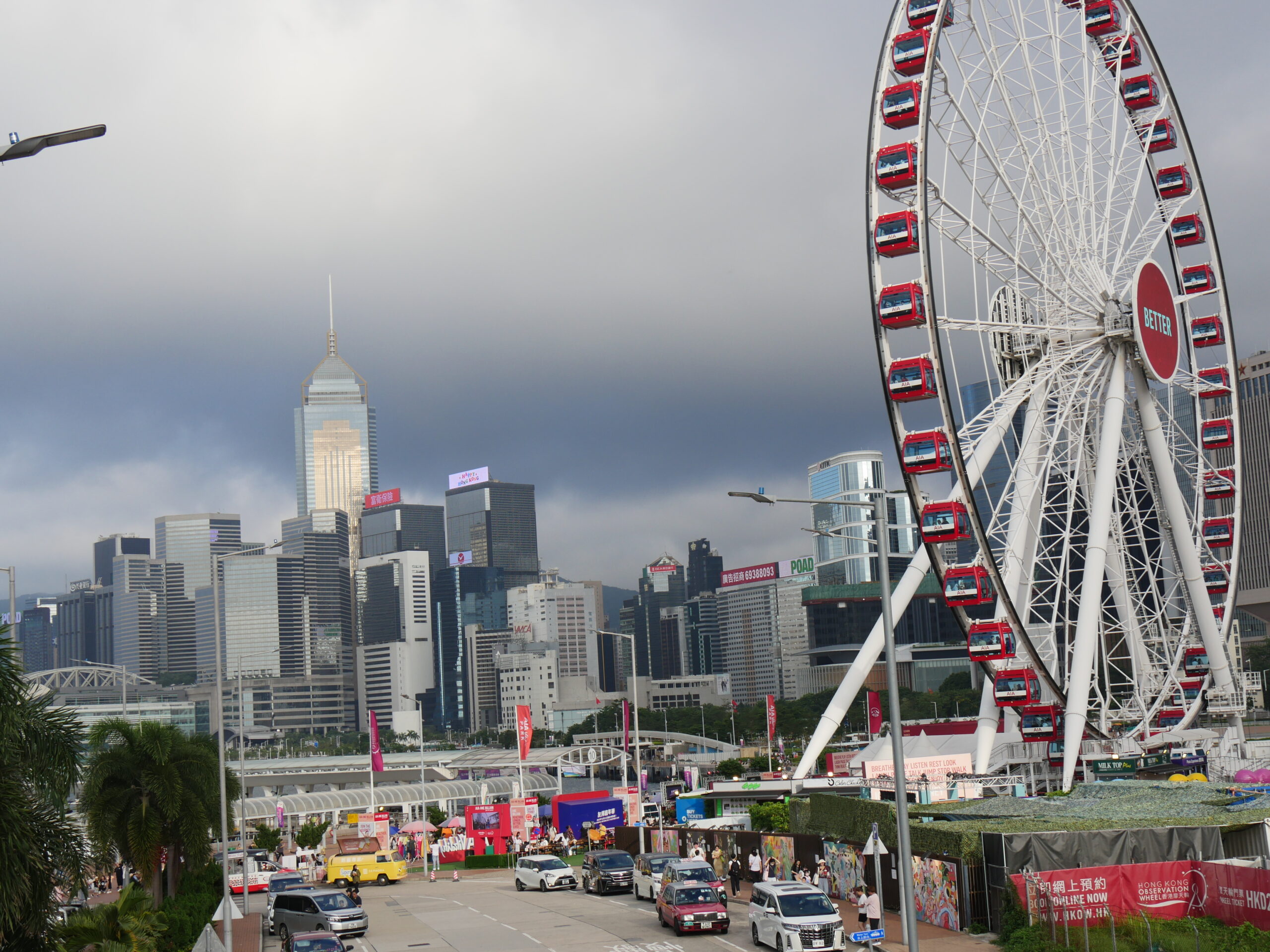
Central is considered the business district of Hong Kong. (Credit: Safiullah Ahmadzai)
“Most of my alumni, including myself, had little knowledge about Hong Kong before we applied for this scheme. We all have a stable and comfortable life here in the mainland. Why should we move to Hong Kong? We were just testing the water.”
Though many mainland Chinese people applied for the scheme, not many actually come to Hong Kong.
According to the data released on May 13 by Chris Sun Yuk-han, the secretary for labour and welfare, the Hong Kong government has received approximately 27,000 applications for TTPS over the past six months. He also mentioned that two thirds of applicants were from the mainland, and a notable number of overseas applicants also have a mainland background. Currently, around 17,000 applications have been approved. Among those 10,000 applicants who have successfully obtained a visa, half of them have already come to Hong Kong.
However, the new scheme has also been under scrutiny and criticism since its launch for its lack of immigration preparation services, which includes job hunting and living checklists.
The easy application process – which usually takes about four weeks – has apparently nudged many to apply even though they do not have plans to move to Hong Kong, let alone join its labour force or contribute to the city’s economy. After successfully obtaining the visa, a lot of them hesitate to relocate to Hong Kong. Some of them are even taking advantage of the scheme to attain the city’s entry permits for various other purposes other than employment.
Designed to stem the financial hub’s record brain drain and boost its competitive edge in the global competition for top talent, the scheme hasn’t been able to attract the sort of talent it most needs: professionals with rich working experiences. Under the booming application number, the actual effectiveness of the scheme to fill the labour shortage has been called into doubt.
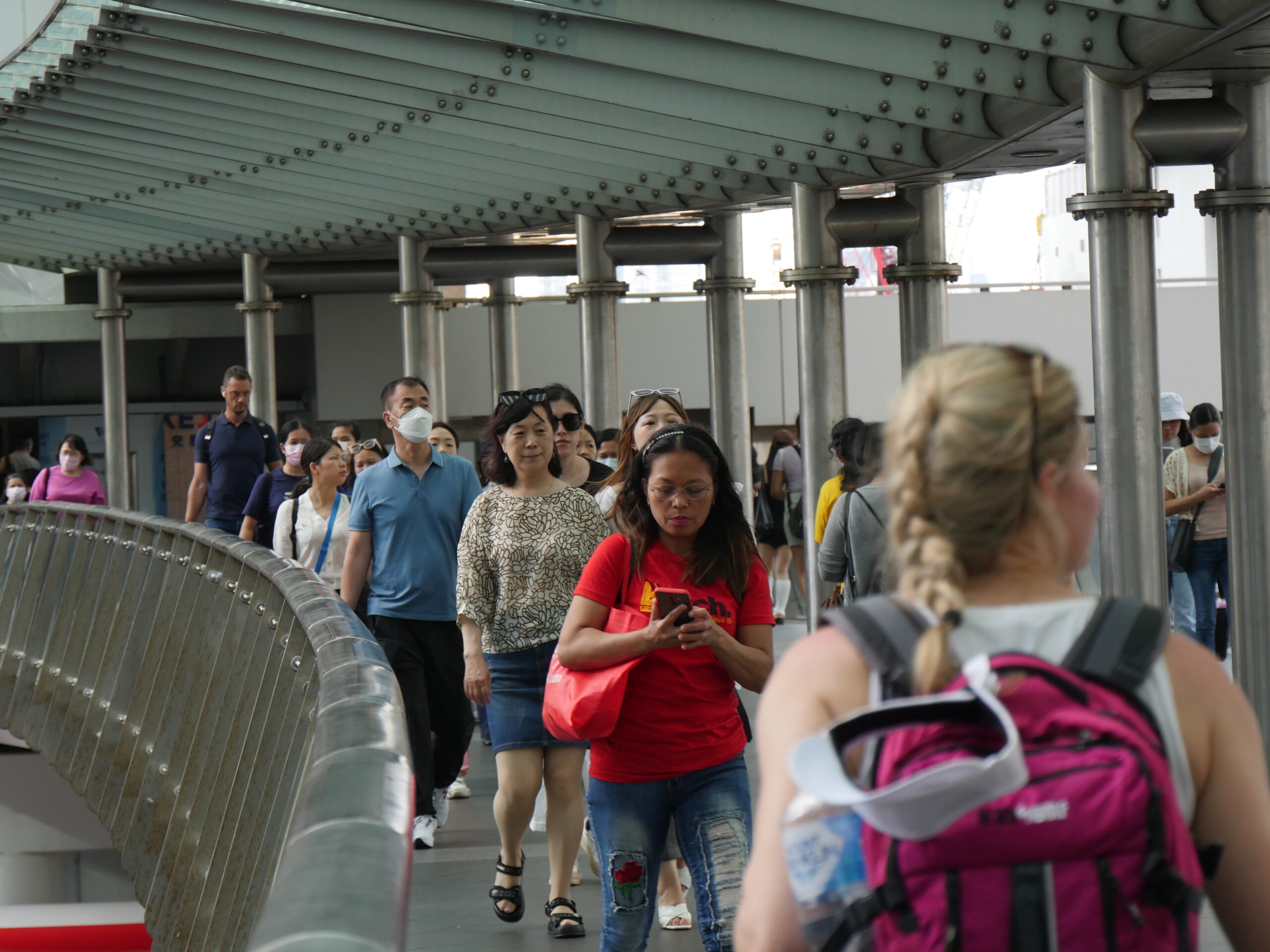
People are walking across a pedestrian bridge in central Hong Kong Island. (Credit: Safiullah Ahmadzai)
“We cannot judge whether the scheme is successful or not by merely looking at the number of applicants, but rather to see whether the size of the workforce can return to its previous level,” said Professor Chong Tai Leung, Associate Head of New Asia College and Associate Professor of Economics at the Chinese University of Hong Kong.
Describing the government’s new talent scheme as “ineffective”, Professor Chong said that the government’s approach to solve the city’s labour loss problem is not well-thought-out, as lowering the entrance standards to attract talent is obviously far from enough. It’s an act of policy expediency but not conducive to a long-term solution.
“In fact, the government introducing this new scheme is like handing in homework just for the sake of it, while not caring much about the final grade – the outcome,”Chong said.
Labour Shortage
Hong Kong is facing a dire shortage of skilled labour. The unstable political environment, mass protests, followed by the strict covid-19 regulations, resulted in a huge wave of population outflow. According to Census and Statistics Department’s data released on April 3, Hong Kong’s labour force dropped 2.4 percent year on year in 2022, which is a loss of 94,000 workers. This percentage dip made a record for the largest drop since 1985. Among them, the group aged 25 to 29 became the majority, contributing to a total of 28,200.
The Hong Kong government has been seeking to counteract this record human resources outflow. In the 2022 policy address, the government has successively launched a couple of new policies, including relaxing the Quality Migrant Admission Scheme admission, introducing the Top Talent Pass Scheme which has a lower application threshold, and extending the work visa period from one year to two years for non-local graduates.
Li Zhi, who works at Juyi Overseas, a mainland migration agency that specialises in Hong Kong immigration, said the number of people who came to consult Hong Kong immigration doubled after the launch of TTPS.
“About 200 people come to inquire about Hong Kong immigration every month,” she said. “In the past, people were more inclined to know about the Quality Migrant Admission Scheme, and now the new scheme gives them more choices.”
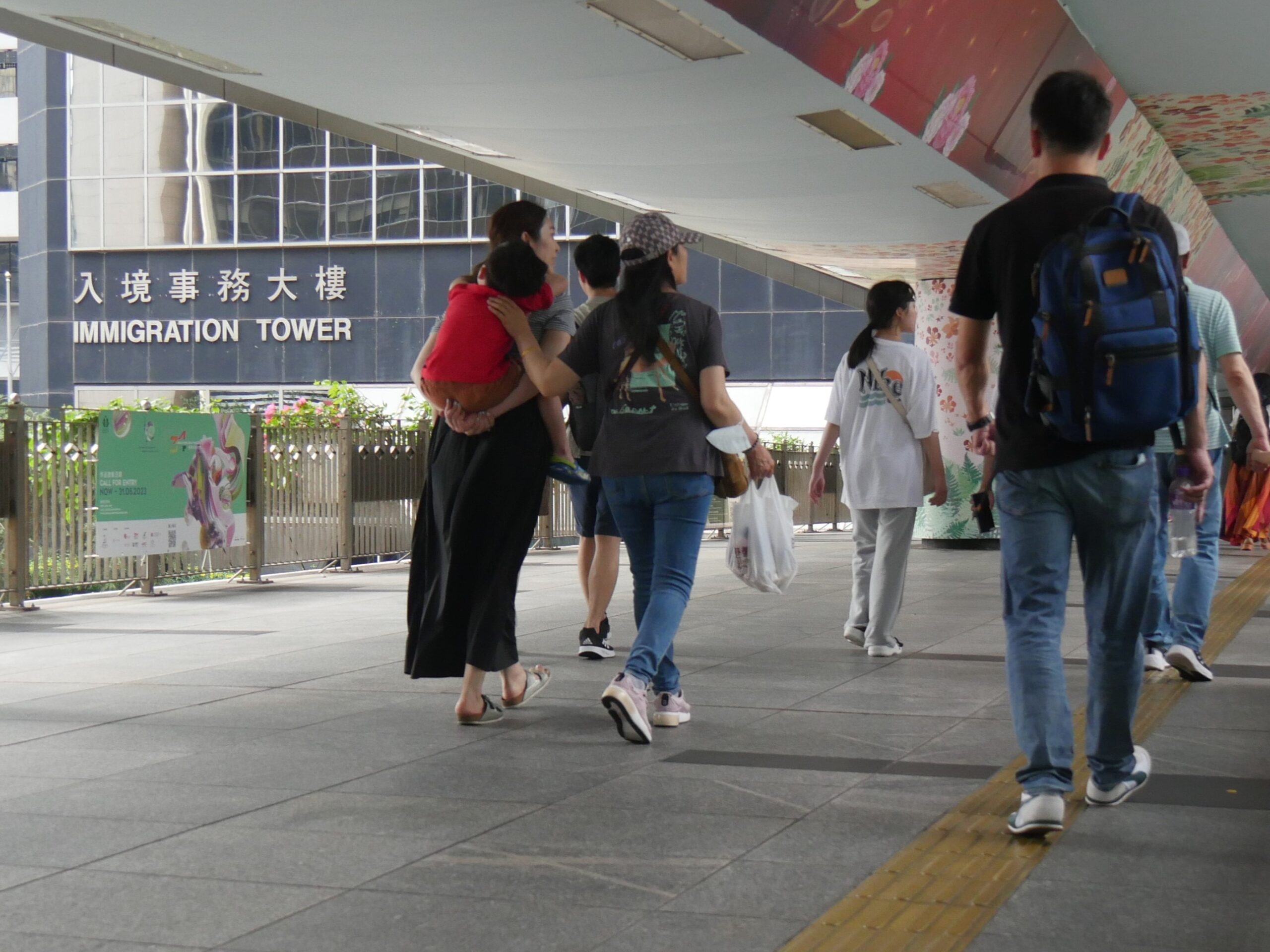
People walk to the immigration office in Wan Chai. (Credit: Safiullah Ahmadzai)
Dr. Vera Yuen Wing-han, an economics lecturer at HKU Business School, pointed out that Hong Kong is losing its working population, and is left with increasingly more elderly people, but the government’s new talent attraction scheme failed to solve that problem effectively.
“In general, the policy just wants to fill the population gap, and the government thinks that it would slow down the decreasing competitiveness of Hong Kong before they can figure out ways of economic growth in the future. Therefore, the talent scheme is more like giving out easy visas.”
“A Good Springboard”
Guo Yanbing, a 32-year-old woman from the southeast port city Xiamen, said she used her TTPS visa mainly for the convenience of visiting Hong Kong with her family “as a tourist visa”. Guo received her approval letter in March, one month after her application.
After giving birth to her two kids in the United States, her plan is to immigrate there with her family. The family made a visit to Hong Kong in early April to register for the Hong Kong Identity Card, after her husband and her two kids got the visa as her dependents.
“Hong Kong is a good springboard, not too far from my hometown Xiamen, and it will be easy to move to other places in the future,” Guo said.
Guo has been working in the architecture field for many years. She found Hong Kong’s job market rather grim, with few companies in her industry offering positions. She is currently looking for job opportunities from her alumni chat groups.
Where are the Jobs?

Zhang. (Credit: Zhang Louyu)
Hong Kong is regarded as an international financial centre, but securing a job in Hong Kong could be hard even for finance major graduates.
26-year-old Zhang Luoyu graduated from the University of Sydney, with both a bachelor’s and a master’s degree in finance. After successfully obtaining the visa in early April, she had a strong intention to work in Hong Kong, believing this financial hub could provide her with more opportunities. Although she would eventually like to return to the mainland, she thinks the working experience in Hong Kong would benefit her future career prospects.
However, she didn’t realise that finding a job in Hong Kong would be so difficult until she started to apply online through job searching websites such as JobsDB and Indeed.
“The application results were not good,” Zhang said. “Most of my submissions were unreviewed, and some replied to me that the position has already expired. I had few positive responses.”
Meanwhile, as a Beijing native, she found herself more popular in the mainland labour markets. Without receiving any satisfying responses from Hong Kong, she suspended her moving plan and decided to stay in Beijing for now.
An Expensive and Tough City for New Life
Hong Kong’s high cost of living, tough job markets, expensive housing markets, and lack of family welfare policy for new immigrants make those well-educated, middle-aged mainlanders with considerable working experiences – the TTPS’s target groups – think twice about moving to Hong Kong.
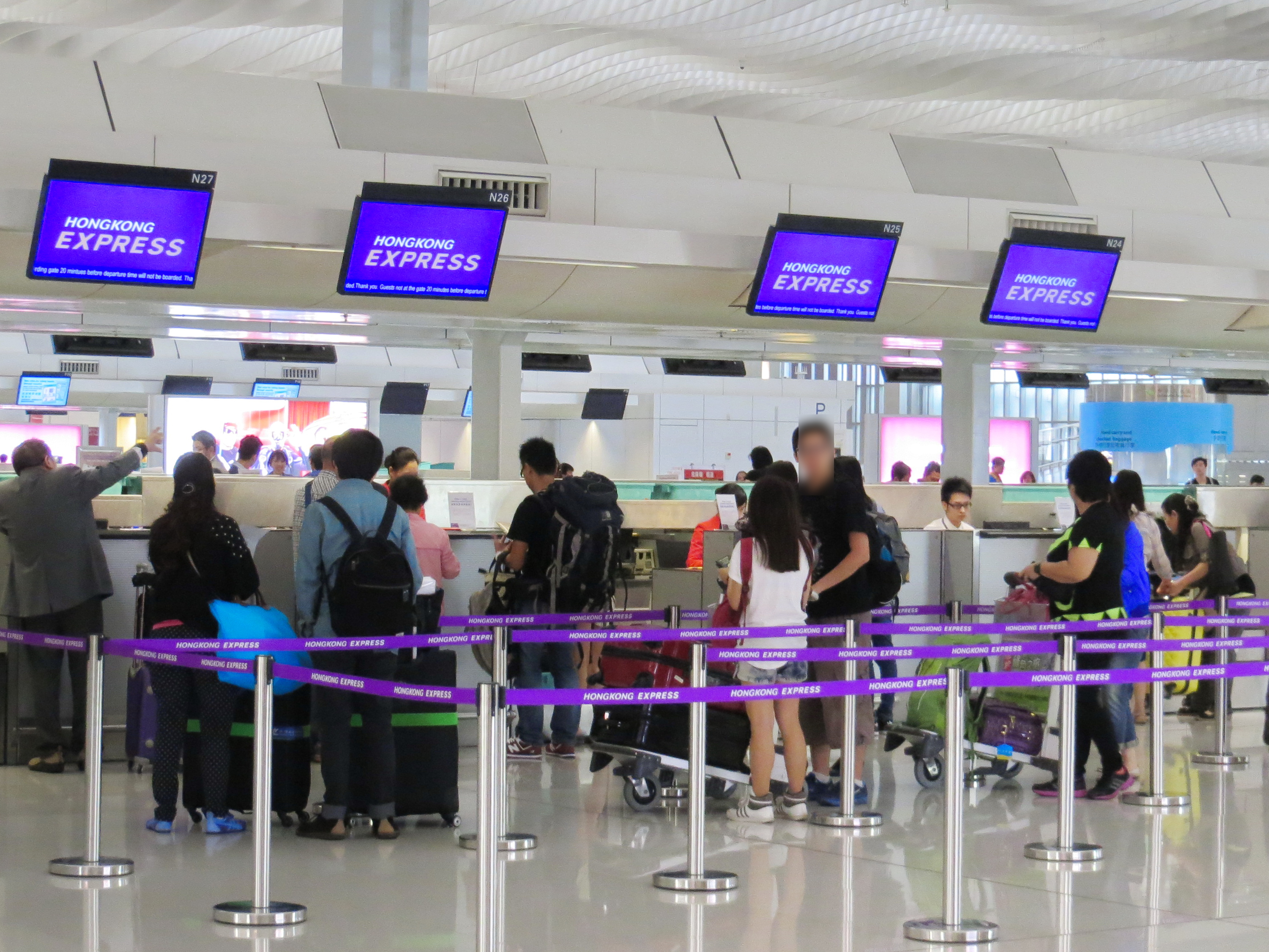
Check-in counter area at Hong Kong International Airport. (Source: Wikimedia Commons)
Ma, the mother based in Wuhan, said it won’t be easy to relocate the entire family to another city.
“Not like those younger graduates, it is a big challenge for us to start over a new life in another city as the middle-aged group, especially when you have children,” she said.
Apart from her preference for the mainland’s public education system, Hong Kong’s high living expenses also made her retreat.
In late March, Ma came to Hong Kong to activate her visa and register for a Hong Kong Identity Card. At the same time, she started to learn about the local housing market. With the initial expectation of spending around thirty to forty thousand per month on renting, the actual rent reached fifty to sixty thousand. She also calculated that the education expense to raise her three children would be much lower in the mainland.
“To effectively introduce talents and make them stay, I think the best way is to offer them substantial benefits, especially in terms of education and health care. To think from their perspectives, like getting them to pay less taxes or lowering their children’s schooling fees. We are not attempting to attract people who still need training, but those with experience and the ability to make money.”
A Gaping Mismatch
Two-thirds of Hong Kong’s 1.4 million loss in the labour force between the second quarter of 2020 and the second quarter of 2022 are high-skilled workers, according to Chris Sun Yuk-han in “The Chief Executive’s 2022 Policy Address” released last year.
“Associate professionals”, such as health workers, air traffic controllers, interior designers, public relations and sales professionals, and IT managers, make up the largest share of all workforce losses in the past two years, according to the Hong Kong Census and Statistics Department.
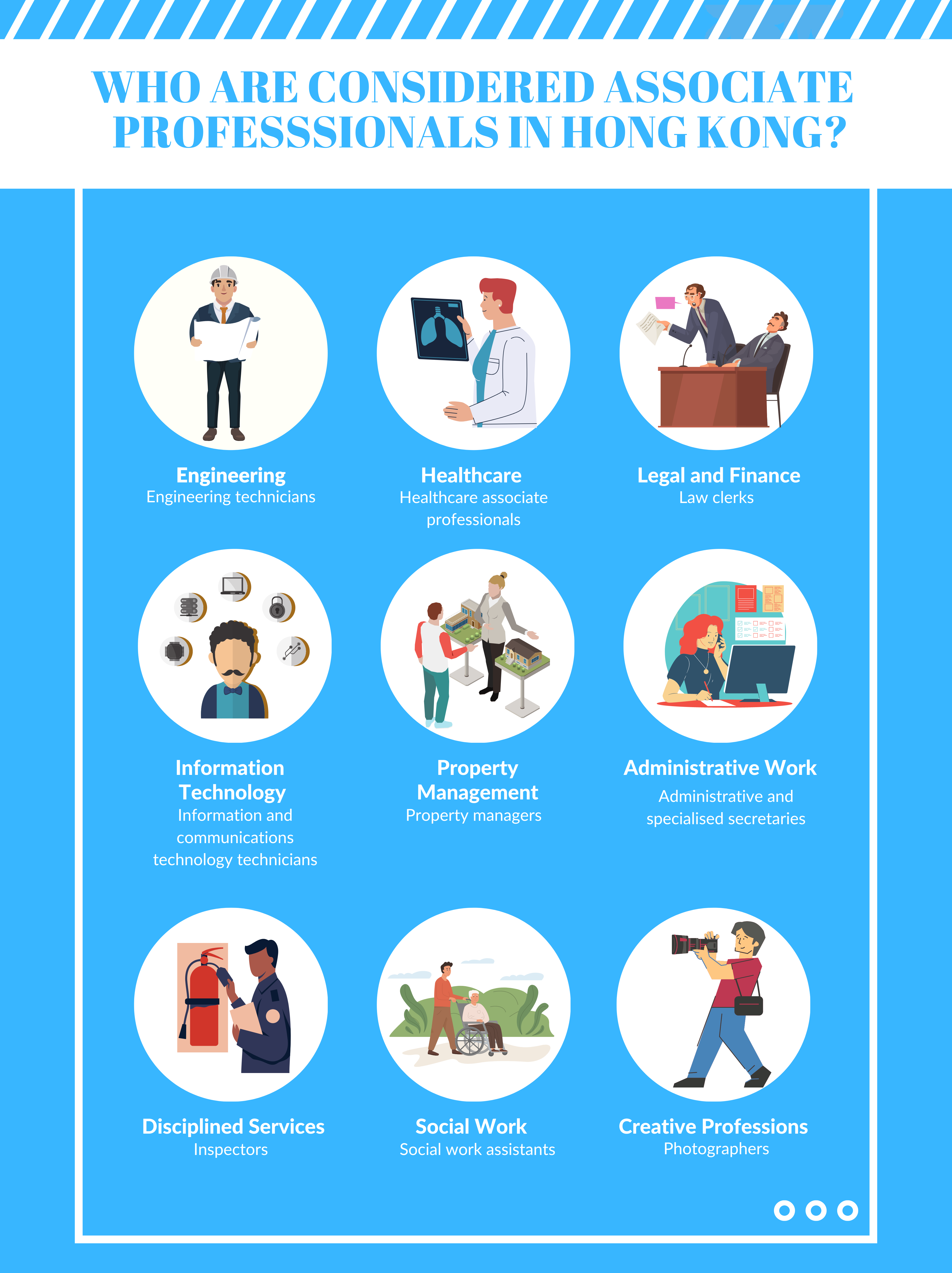
Credit: Agnes Wang
According to an article penned by Sun in Ta Kung Pao in early April, more than half of the new scheme’s 20,000 applicants are graduates with merely three years of working experience, and 27% are fresh grads with little professional experience. Among the successful applicants, half are under 30 years old and 80% are under 40 years old.
This led to a salient mismatch in terms of expertise and experience between the newly attracted talent and the labour outflow.
“I think the population gap will be slowly filled anyhow, but then it really depends on the speed of it and also the industry,” said Dr. Yuen from HKU.
“I’m not sure whether those people who come with talent scheme visas can exactly match what the Hong Kong industries want.” Yuen said. “But it won’t happen immediately, as it takes some time for the businesses to figure out what they would do if they don’t have enough people.”
Rich People’s Plans
A large portion of immigration agent Li Zhi’s clients are high-income applicants, whose annual income reaches HK$2.5 million or above.
“Most of them don’t plan to come to Hong Kong to work as they already have stable careers overseas or in mainland China. They are most concerned about obtaining permanent residence status,” Li said.
“Compared with the previous talent plan, the Top Talent Pass Scheme application threshold is lower, and the renewal process is easier for most applicants,” she added.
Xu Huiling, a 46-year-old housewife, has obtained a Hong Kong visa through TTPS category A, which requires applicants to reach an annual income of HK$2.5 million or above.
Xu has two children, and her husband runs a large furniture company. The family currently lives in Hangzhou, the capital city of Zhejiang province. Xu mentioned that one of their plans is to conduct parts of the business in Hong Kong, so that they can transfer some of their assets here.
“I applied for this TTPS visa also because I want to accompany my second child to study in Hong Kong, and he already has a Hong Kong permanent identity,” Xu said.
Due to China’s one-child policy, Xu gave birth to her second child in Hong Kong to avoid the hefty fines. Her fifteen-year-old son is now studying at an international school in Hangzhou. Simultaneously, Xu is looking for other international schools in Hong Kong for him to continue studying.
The family has always had plans to immigrate, but has not yet decided to leave or not. Besides, Hong Kong is not their primary choice.
“We already have Spanish permanent residence status, and we chose Spain just because it’s a European Union country,” Xu said. “It is relatively simple to apply for. You can get permanent residence with a real estate of €500,000 (about HK$4,240,000).”
“No matter Hong Kong or Spain, we want our children to have more choices,” Xu added.
Hong Kong’s Edge
But on the other hand, Hong Kong still has its own unique advantage. For talents, particularly those specialised in the financial field and with an overseas education, Hong Kong is still an attractive place.
“We can see an increased number of applicants from the mainland since the new talent scheme was introduced, from about 150 out of 1000 applicants to 300,” said Patrick Wong, a campus recruiter at Ernst & Young, a global accounting firm.
Wong’s talent recruitment team began to make detailed plans for recruiting talent from the Greater Bay Area and expects to recruit more qualified mainland graduates in the next quarter.
Joe Wang, 26, initially applied for the Quality Migrant Admission Scheme, which takes a longer time to process. During the review waiting period, TTPS was introduced. Although his working experience was limited, his application was approved within a couple of days because he had a finance degree from The University of New South Wales.
“In the Asia-Pacific region, I think Hong Kong places number one as a financial centre, its position is unshakeable. For me, there are more opportunities,” Wang said.
“Besides, I started to study abroad when I was in high school. Personally, Hong Kong’s international environment makes me feel familiar and more comfortable,” he added.
Wang found a satisfying job as an investment banking analyst within one month after arriving in Hong Kong. He is looking forward to starting his new life here.
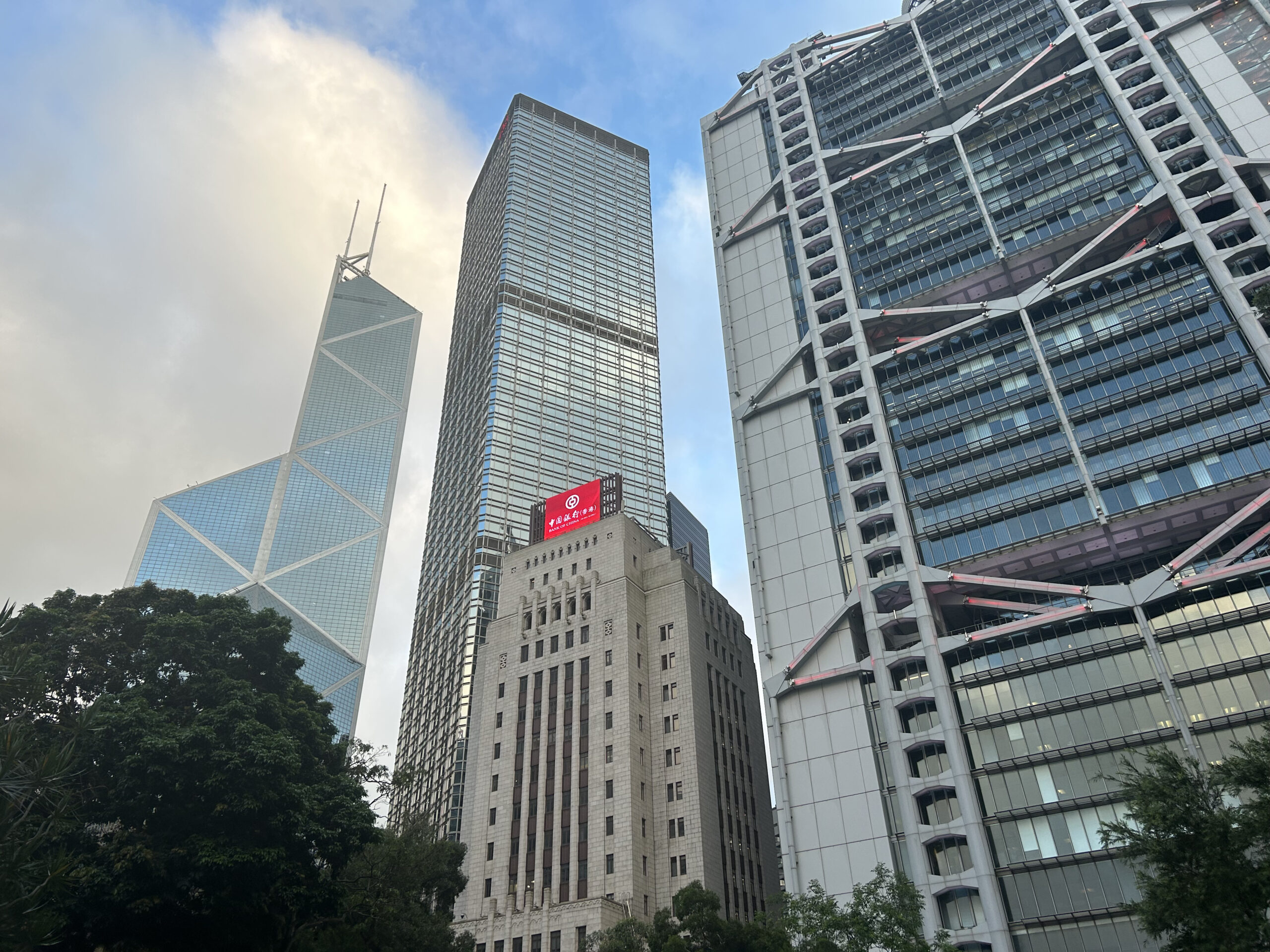
The business district of Hong Kong is filled with skyscrapers. (Credit: Karin Lyu)
Many people like Wang, would like to use Hong Kong as a gateway to further develop their careers.
Duke Sun helped his father, who is 52 years old, successfully apply for the TTPS visa through category B: experienced graduates. After graduating with a bachelor’s degree in mechanics, Sun’s father worked at an engine factory and a software company before running a software company with a friend in Shandong province, East China.
Sun’s father is working and living in Shandong province currently. Sun said that his father desires to work in Hong Kong. For them, the most attractive thing that Hong Kong can offer is the high salary, which also means the company could get software orders at higher prices.
Sun works in Singapore. He learned that if his father wants to obtain a working visa in Singapore at the age of 50, he needs to find a job with a monthly salary of S$20,000 (about HK$117,000), which is very difficult.
“In contrast, Hong Kong’s TTPS is very easy to apply for,” Sun said. “If my father can find a high-paid job in Hong Kong, it’s good. If not, he will consider operating a company here in Hong Kong to attract more orders.”
Localise, Localise
Apart from trying to attract new blood to boost Hong Kong’s anaemic labour market, the government is also creating job opportunities for local graduates.
The Greater Bay Area Youth Employment Scheme was launched in 2021, and the government plans to regularise the scheme this year. This program aims to encourage companies to hire Hong Kong graduates to work in the Greater Bay Area, with a minimum monthly salary of HK$18,000.
On March 30, the Labour Department held a job fair to attract Hong Kong graduates to work in the GBA, providing more than 3,000 job vacancies.
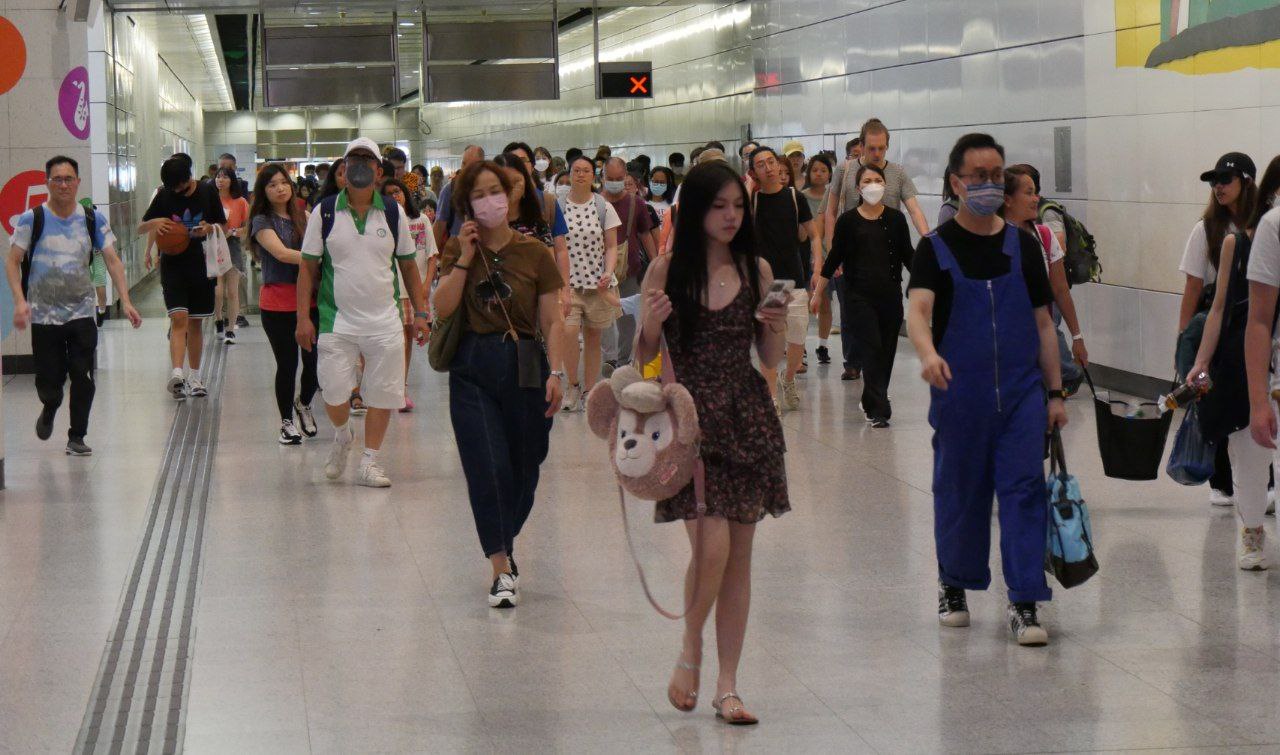
Workers hustling to work by MTR. (Credit: Safiullah Ahmadzai)
The Greater Bay Area (GBA), connecting Hong Kong, Macau, and nine cities in the Guangdong province, is designed to be an economic and commercial hub as part of national strategy. Cities complement each other to promote coordinated economic development.
Hong Kong companies can enter the domestic market in the GBA with benefits from the government, such as simplified business procedures and relaxed regulations in some GBA cities. The fast-developing economic strategy area also enables Hong Kong companies to provide financial services to mainland enterprises and find new economic growth for the financial industry.
But when it comes to incentivising local graduates to stay and work in Hong Kong, there is still a lot of room for improvement.
“I don’t see any new measures to promote graduates to stay in local employment. It’s all set in stone,” the campus recruiter Wong said.
The introduction of the new talent scheme instead brought in a flood of non-local fresh graduates to compete for local jobs, making the situation worse.
In order to avoid “direct competition” with local graduates, according to Sun Yuk-han, the Secretary for Labour and Welfare, TTPS sets an annual quota of 10,000 applicants for those who lack work experience.
“Ensuring the local community embraces foreigners needs more ground work, as the tensions between local and foreign talents are likely to emerge and must be managed carefully and proactively,” Professor Christopher S. Tang, a Distinguished Professor at UCLA Anderson School of Management, wrote in his opinion piece.
“Hong Kong has the ability to attract and retain the foreign talent it needs to develop as a global business hub, but much more effort is needed to make it so,” he added.
Looking Ahead
It has been six months since the initial launch of the TTPS, a couple of changes have been made to fix the existing loopholes in the process.
As the government official stated at the Legislative Council meeting in early April, they will appropriately adjust the details of the scheme and optimise the application process based on application data and feedback from the Immigration Department, after being questioned about the low application threshold.
On February 21, the Immigration Department withdrew He Jiankui’s TTPS visa. He was a Chinese scientist with a criminal record that was not notified in his application. He was sent to jail for three years in China for illegal medical practices after creating the world’s first gene-editing babies.
On the same day, the Labour and Welfare Bureau announced on social media that the Immigration Department would adjust the application process for TTPS and all applicants have to declare their criminal conviction records from February 22. Those who have applied but not been approved must also submit relevant documents.
Regarding the criteria for applicants to be from the world’s top 100 universities, the Chief Executive John Lee Ka Chiu said in a speech in March that he will instruct relevant departments to conduct a mid-term review of the scheme in the middle of this year, and “actively consider adding more excellent schools to the current list”.
An online platform was also created by the government in December after the latest talent scheme was introduced, providing support services for newcomers, especially in terms of living and working in Hong Kong.
Apart from this, the Labour and Welfare Department is also working with various agencies to build the “Talent Support Network” which is expected to be launched in the middle of this year, Chris Sun Yuk-han said in the Legislative Council meeting on May 3. The Department is recruiting relevant persons to be responsible for attracting and supporting upcoming talents.
To effectively attract talents to Hong Kong, economic experts said that offering good job opportunities is the key.
“Essentially, you need to have attractive job opportunities. If you have big corporations that have business in Hong Kong, or have branches in Hong Kong, that could attract talents to come,” said Yuen from HKU.
“I don’t think any kind of subsidies or whatever tax allowance would work, because Hong Kong already has a very low tax rate. By the end of the day, it’s all about whether you can attract good business in one industry, so that it becomes a hub where talents would want to come. If they don’t find good opportunities for their career development, they will go away quickly.”
Extra Credits
Advisor Ting Shi
Editorial Director Hailey Yip
Multimedia Director Madeleine Mak
Multimedia Producer Daoli Zhang
Illustrator Agnes Wang
Photographer Safiullah Ahmadzai & Karin Lyu
Copy Editor Agnes Wang
Fact Checker Larissa Gao
